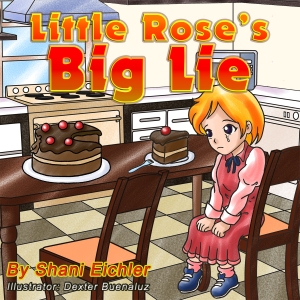Tags
#affirmations for Little Girls, #book, #chidlren's books, #children, #early childhood, #kid-book, #kids, #kindle, #MazorBooks, #picture books, #self-esteem, bedtime story, children books with good values, good values, honesty, tellling the truth
 Kids are not born with a moral code. They watch and adopt behaviors modeled for them by their caretakers. Until the ages of four or five children do not at all understand ethics and moral reasoning. Lying during those early years stems primarily from a need to defend and/or deflect possible disapproval or punishment. For example, an angry parental tone of voice asking “Did you break the toy?” will most commonly be responded to with “no!” regardless of the truth.
Kids are not born with a moral code. They watch and adopt behaviors modeled for them by their caretakers. Until the ages of four or five children do not at all understand ethics and moral reasoning. Lying during those early years stems primarily from a need to defend and/or deflect possible disapproval or punishment. For example, an angry parental tone of voice asking “Did you break the toy?” will most commonly be responded to with “no!” regardless of the truth.
As they grow up, children gradually develop an understanding that enables them to distinguish between truth and falsehood. Yet the compliance with the rules during the years between five and ten is engendered most frequently by a desire for adult approval. Research does corroborate the above as it shows that children that are raised in homes that put an emphasis on truth, honesty and other behavioral values are less likely to lie or at least lie less often.
By age ten most children know when and why they lie, and their reasons for lying are plentiful. Motives that prompt dishonesty include:
– An effort to cover up bad or inappropriate behavior
– Attempt to avoid chores or doing something they prefer not to do (like homework)
– A desire to fit in socially
– A rebellion against authority
– An IMITATION of their ROLE MODELS – the major culprit!
It is important for adults to be cognizant of the fact that kids notice EVERYTHING. A parent that calls in sick when they are feeling well but wish for a day off models a behavior that encourages cutting class and lying about it. A parent that lies to their spouse to avoid argument models a behavior that encourages lying for supposed “self-preservation.” A parent that boasts having cheated to obtain better grades in college models a behavior that lying and cheating are fine so long as one is not caught.
Though situations arise in which stretching the truth or even stating a lie is the right course of action, as a rule HONESTY is indeed the best policy. Honesty is a virtue that should be valued by all. The responsibility to conduct oneself in a truthful honest manner is even a bigger obligation for a parent, as his or her deportment serve as the moral and ethical blueprint for their children.
Reading to or with your children BOOKS that promote good values is an entertaining and educational way with which to introduce behavioral values to family discussions.
Check out: LITTLE ROSE’S BIG LIE by Shani Eichler. An adorable story about a little girl who lies to her mom after she could not resist taking a forbidden bite from a chocolate cake. This sweet book ends happily as it imparts a moral lesson that will resonate with adults and children alike.
———-
Excellent way to get your kids talking and sharing!
Impress on your kids the VALUE of Honesty!
EIGHT 5-Star Reviews!
http://tinyurl.com/RoseBigLie
“Little Rose’s Big Lie” Only $1
Paperback ON SALE, 10% off!
Read with your kids and enjoy this adorable, entertaining and educational book, written by 16-year-old Shani Eichler, and ENJOY A DOUBLE BENEFIT. Your beloved children will not only improve their reading and comprehension capacities by also learn and internalize the importance of telling the truth.

Enlightening post that delivers an important message for parents.
Thanks, Janice.
Reblogged this on MazorBooks.